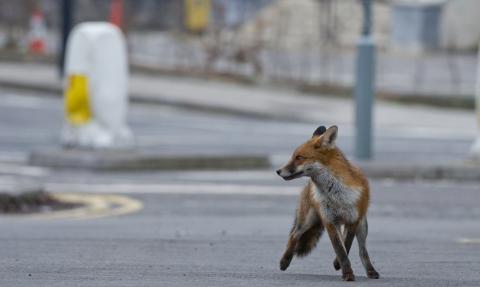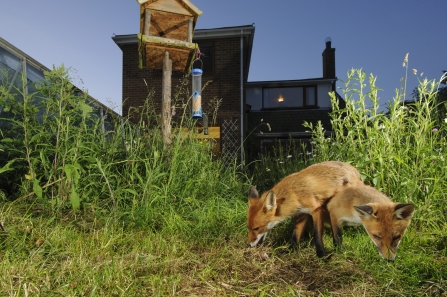
Credit: Bertie Gregory/2020VISION
Urban foxes, your questions answered
Foxes (Vulpes vulpes) have made a success of living with people. This is not based upon their mythical cunning, but rather their ability to adapt to a range of changing conditions. Wherever you live in Birmingham and the Black Country, you probably have at least one fox visiting your garden. We know more about urban foxes in Britain than we do about their rural counterparts and have compiled answers to the most common questions we are asked about our fantastic furry friends.
What do urban foxes eat?
They have very varied diet, Urban foxes eat earthworms, insects, fruit and vegetables and a wide variety of both domestic wild birds and mammals. Insects include large numbers of beetles, cut worms (the larvae of noctuid moths, which they get off lawns on wet nights), and both larval and adult craneflies. Most of the birds they eat are feral pigeons and small garden birds, and the most frequently eaten mammals are generally field voles, abundant on allotments, railway lines and other grassy areas.

Credit: Terry Whittaker/2020VISION
Should I feed my foxes?
If you want to, yes; lots of people feed foxes, either regularly or occasionally, and get a great deal of enjoyment from doing so, but please be aware they are wild animals - feed and watch them, but don't try and tame them. In particular, don't put out excessive amounts of food and clear away any uneaten food. This will help ensure you do attract unwanted visitors, such as rats or cause a nuisance to your neighbours.
What should I feed them?
Virtually anything. Being carnivores, they like cooked or raw meat and tinned pet food. Foxes also like other savoury items such as cheese, table scraps, bread soaked in fat, fruit and cooked vegetables. However, be aware that anything you put out for foxes could equally be taken by dogs, cats and other wildlife.
Will the foxes become dependent on me?
They won't become dependent on you, but if foxes are fed heavily and regularly they can be come over-confident and less wary of people. This could encourage them approach strangers for food, a situation that should no be encouraged. It's best not to put out large amounts of food every night, If you don't feed them, there are plenty of other food sources around. It may be strange but urban foxes frequently eat peanuts, bird seed, and other food put out on bird tables.
Do foxes have trouble finding food in bad weather?
No, there is still plenty for them to eat, but if you want to give the foxes some extra food, then do.
Why do the foxes run off with the food I give them?
Foxes cache their food (bury it to consume later), hiding it fast before some other animal takes it. A fox will go from house to house repeating the process, returning later to consume its bounty.
Why do I find dead animals buried in my flowerbeds?
The foxes have been caching surplus food, and are likely to be back within a few days to eat it. Foxes are not all fussy about sell-by dates, however, and some of the food they consume is more maggots than anything else, but is still eaten with relish.

Credit: Bertie Gregory/2020Vision
Should I hand-feed the foxes?
No. Do not try to make foxes tame. While it is a great thrill to have wild foxes coming to take food from your hand, problems arise because many urban foxes are now so tame that they approach strangers in the expectation of being fed. Perhaps not surprisingly, a lot of people are scared by such behaviour because they do not know if the foxes are being aggressive or just inquisitive.
Will foxes kill my cat?
It’s possible but very unlikely. A typical urban fox home range can be occupied by upwards of 100 cats, and most of these are out at night. Foxes and cats meet many times every night, and invariably ignore each other. When a fight does break out, it’s often the fox that comes off worse in the encounter.
Will foxes kill my pet rabbit/guinea pig?
Yes, they might if you do not look after it properly. But it’s easy to ensure it is safe; do not leave it out at night, make sure the hutch is securely bolted; and have weld mesh, not chicken wire (which foxes can easily break) on the front. If you take these precautions, there should be little risk.
Will foxes kill large animals?
Yes, very occasionally they tackle animals as large as swans on park lakes, small goats in city farms, and even animals in zoos.
How can I stop them digging up buried pets?
This is very difficult to prevent, and obviously distressing if it’s a child’s pet. But can you blame the fox? It cannot believe its luck that there is an easily accessible food source. However deep you bury your pet, it will invariably be dug up, and the fox will keep re-excavating the hole even after it has taken away your pet – perhaps to throw away another perfectly good meal.
Can I stop them digging up my lawn?
This is not always easy to do. Try using a mammal repellent available from garden centres or DIY stores and follow the instructions on the container.
Can I stop them trampling the garden?
This problem is mainly caused by cubs playing in the late spring and early summer. They can do considerable damage to flowerbeds and cloches. But playing in gardens may also lead to disaster for the foxes, and fox cubs frequently get hung in garden netting or entangled in lengths of garden line left lying on the ground. Either securely block all the entrance points to the garden or find where the cubs are lying up and persuade them to move elsewhere by use of animal repellents and general disturbance. Better still, remember it's a short lived problem that will go as the cubs get older and try and enjoy the wildlife!

Credit: Helen Taylor
Can I stop foxes fouling my garden?
No. People are sometimes incensed that foxes leave faeces on their shoes, in a hole that they have dug to put some plants in, or on top of a pet’s food bowl. But foxes use urine and faeces to mark their territory, and so tend to leave their scent marks in conspicuous places, especially on objects to attract their attention. So anything new or exciting to the foxes is likely to be marked. Also, it’s very difficult to keep foxes out of your garden; an adult fox can get through a hole 10 cm square, and scale a 2m high wall or fence with comparative case.
Why do I keep losing things from my garden?
Foxes love to play, particularly with things that smell good – old shoes, dog chews, balls and gardening gloves are favourite items. The only solution is to ensure that you do not leave interesting play-things lying around lying your garden.
Why do they make those awful screaming noises?
Although they can make a wide variety of calls to maintain contact with each other, foxes are usually remarkably silent. They are most vocal in the winter, but even then call on average only once every three nights; this declines to once a week in the autumn when they are least vocal. Of all the calls they make, it is the screams that cause the greatest problem; they are incredibly blood-curdling and are often mistaken for someone being attacked.
Will the foxes attack me or my children?
There few reports of foxes attacking people - a handful a year, while the NHS report that more than ten people a day go to hospital for treatement for dog bites. A fox may bite or defend themselves if cornered (most recent instances of fox bites happened when a fox was cornered or in unfamiliar surroundings). So if you find one in a shed, or even in the house, leave the doors open and it will flee as quickly as it can. Also do not worry about leaving your baby or children in the garden; foxes often show less fear of children than adults, but are unlikely to attack one.
Do foxes hunt in packs?
No. While foxes live in family groups that average three to four adults, with four to five cubs born each spring, they generally lie up alone during the day, and also forage alone. In fact, on average, they meet another member of the family group only twice each night, and these meetings are generally very brief, often less than a minute. The only time you may see foxes spending time together is when the adults are playing with cubs at the earth. Often in the early morning, or if the foxes are scavenging at a productive food source – a rubbish tip or in a garden where the householder puts out lots of food. But they do not hunt together; what’s the point when they prey consists of insects or small mammals and birds?

Credit: Terry Whittaker/2020VISION
Will foxes cross-breed with my dog?
No. It is impossible for a dog and a fox to produce offspring together, and foxes generally give dogs a very wide berth.
Do the foxes pose a health hazard?
Foxes are prone to a variety of diseases, virtually all of which occur in domestic dogs. These include parvo virus, distemper, ear canker and sarcoptic mange, which is invariably fatal. In the case of the latter, the mites burrow into the skin and cause severe irritation; over a period of three to four months the fox loses most or all of its fur and dies of emaciation. It really is a horrible disease, and is also found in rural foxes and, contrary to popular belief, is not a consequence of urban scavenging.
The other parasite of importance is Toxocara canis the intestinal worm which, very rarely, causes toxocariasis in children. The worm is common in both dogs and foxes and the same precuations should be taken with fox poos as you would with dog poo. It is unclear whether foxes infect dogs, dogs infect foxes, or each acts as a reservoir of disease for the other. Finally, it is also important to remember that the vast majority of urban foxes are perfectly healthy and not the disease-ridden animals they are sometimes portrayed to be.
What about rabies and the Channel Tunnel?
Britain has been rabies-free for most of this century, and the only way the disease will ever reach this country is if someone illegally imports an infected animal. Even if that does happen, there are well-prepared contingency plans to deal with any problem. As for the Channel Tunnel, there is an incredible series of barriers to prevent an animal getting into the tunnel, and as a point of entry through which people can smuggle pets, it is only one of many. So far, the vigilance of our customs officers, and a certain degree of luck, has kept us rabies-free. With some signs of success in the vaccination campaign in Europe, it may be that the threat of rabies will soon be diminished.
Is the urban fox a different species?
No. Foxes born in cities may disperse to the country, and vice versa.
Do urban and rural foxes look different?
No. You often hear stories that urban foxes are greyer, and have less good coats, or foot problems from walking on concrete all the time. These are all myths.
Why do foxes live in our cities?
Why shouldn’t they? After all, they are found everywhere they can find food and shelter, from the deserts of North Africa to the Arctic. Since foxes have exploited every other suitable habitat, it would be surprising if they had not become city-dwellers.

Credit: Terry Whittaker/2020VISION
When did foxes colonise our cities?
Foxes have probably been present in our cities in very small numbers for some time, and there are even reports of foxes living in Victorian London. But the main colonisation occurred in the inter-war years, when our cities rapidly expanded to produce large leafy suburbs of owner-occupied semi-detached housing. This period of expansion produced an ideal habitat for foxes, which they quickly occupied.
Where should I look for urban foxes?
Foxes are still most abundant in the areas of cities they first colonised – the 1930s owner-occupied residential suburbs. They are less common in industrial or commercial areas, those old Victorian parts of cities that have small gardens, and modern housing estates that are open-plan or that offer little cover for foxes. As a general rule, foxes are much rarer or even absent in the industrial cities of northern England, much of Wales and parts of the Midlands, and most abundant in the commuter towns of South-east England.
You are most likely to see foxes at dawn or dusk as they are often more active then. They spend their days in a sheltered, secluded spot either above or below ground. Male foxes, called dog foxes, are not much larger than cats weighing about 6.5kf (14lb) and standing 35cm (14") at the shoulder. Female foxes, called vixens, are slightly smaller. Their colours may vary slightly and during the spring and summer months they may look extremely scruffy as they moult.
Are urban foxes found in any other country?
Yes, but no country has as many as Britain, nor are they as widely distributed. On the Continent, they are found in relatively few cities, and when they do occur, they are not as numerous as in many English cities. In Australia (where foxes were introduced in the late 1800s for hunting), foxes are widespread and abundant in a number of cities. In North American cities, it is racoons that live in suburban gardens, and it may be that they out-compete the foxes.
Where do foxes breed?
Almost anywhere. The commonest site is under a garden shed. Adult foxes are very small (males average around 6kg, females around 5kg, with occasional animals up to 8.5kg) and can squeeze through very small holes. Thus it is easy for them to get under a garden shed that is raised off the ground on a brick. The foxes do not have any bedding and the cubs are born on the bare soil. If necessary, foxes are very good diggers, and will excavate extensive earths.
Are urban fox numbers increasing?
No, though this is a common myth. For most cities, maximum densities were reached a long time ago, and numbers are maintained at a constant level by the foxes themselves.
Should urban foxes be controlled?
No. Most urban fox populations regulate their own numbers, by limiting the number of cubs they produce each year. This they do remarkably successfully, and the cubs that survive to adulthood almost exactly replace the number of adult foxes that die each year. If you try to cull them, the foxes respond by producing more cubs to replace the foxes that have been killed. So you do not achieve anything. Furthermore, foxes in urban areas do not cause a big enough problem that they need to be culled; the vast majority of people in cities are either indifferent to the presence of foxes or welcome them.
Have urban foxes ever been controlled?
Yes. In the 1950s the Ministry of Agriculture and Food (as it was then) started to kill foxes in London boroughs. But control operations have now mainly been abandoned as a waste of time and money. While the commonest techniques were trapping or shooting, in Plymouth, a local pack of foxhounds was called in to kill foxes living in the city. Fortunately, riding to hounds in our cities never caught on as a modern-day field sport.
Why shouldn’t foxes be released in the country?
There are a number of misconceptions here. The first is that foxes do not belong in cities; they do – they are there by choice because it is an ideal place for them to live. The other is that they can all be caught and returned to the countryside, where they will "live happily ever after". There are no large areas of fox-free territory in which to release all these foxes, and being dumped in an area which they do not know will mean that their life expectancy will be very short. So you would not be doing any kindness to the foxes. Nor would you be popular with the local farmers: foxes dumped in a strange area are likely to cause more problems than the resident ones.
Are urban foxes being dumped in the countryside?
No; this is yet another myth. These tales invariably refer to a lorry specially equipped with a large number of holding cages having been seen dumping foxes all over Wales, the Lake District and elsewhere. If even a fraction of these reports were true, there would now be a great dearth of foxes in our cities.
What do I do about an injured fox?
The main cause of death for urban foxes is the motor car, but not every animal hit by a car is killed, and injuries are common. In London, about a third of foxes have healed fractures received from road-traffic accidents. If you find an injured fox, contact the local police station or The National Fox Welfare Society for help. Otherwise, call out the local veterinary surgeon. Though many are reluctant to take on wildlife work, they are meant to offer a 24-hour service and not to charge for wild animal work. For more advice, it’s worth contacting The National Fox Welfare Society.
What do I do about orphaned fox cubs?
Foxes normally leave their cubs unattended and only return briefly to feed them. So do not automatically assume that the cubs you find are orphaned just because there is no sign of the parents; if the cubs are lying quietly, they are undoubtedly being cared for; when they are hungry they will start making plaintive barking noises. If you think the cubs are deserted, do not touch them. If the whole litter is together and hungry, then it is quite likely that the mother has been killed. But if it is just a single cub that is found, it is much more likely that it has strayed and cannot find its way home. The plaintive barking is a contact call; don’t touch the cub, keep an eye on it to ensure that it is not attacked by a cat or a dog, and soon after dark the vixen will recover it.
